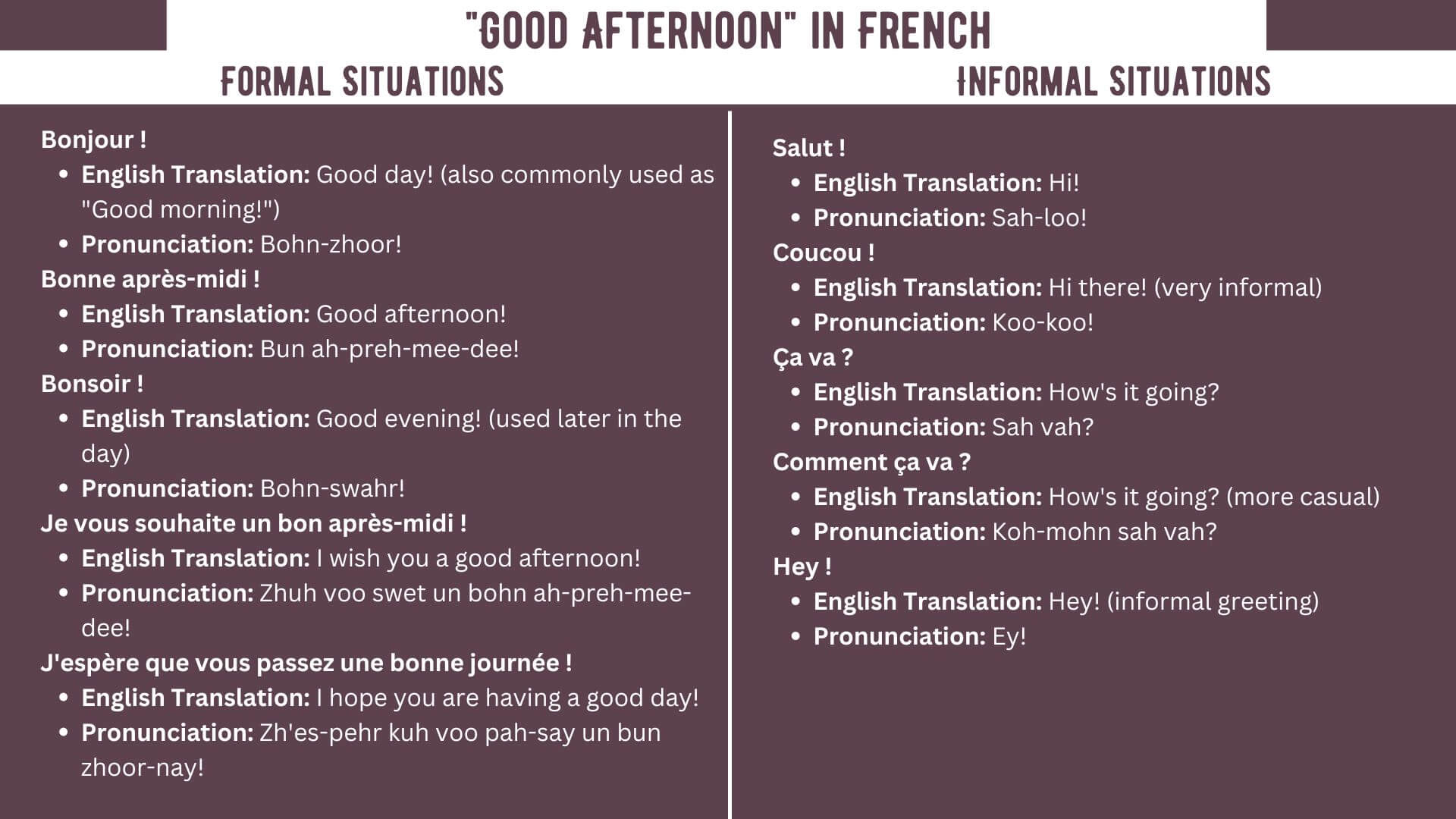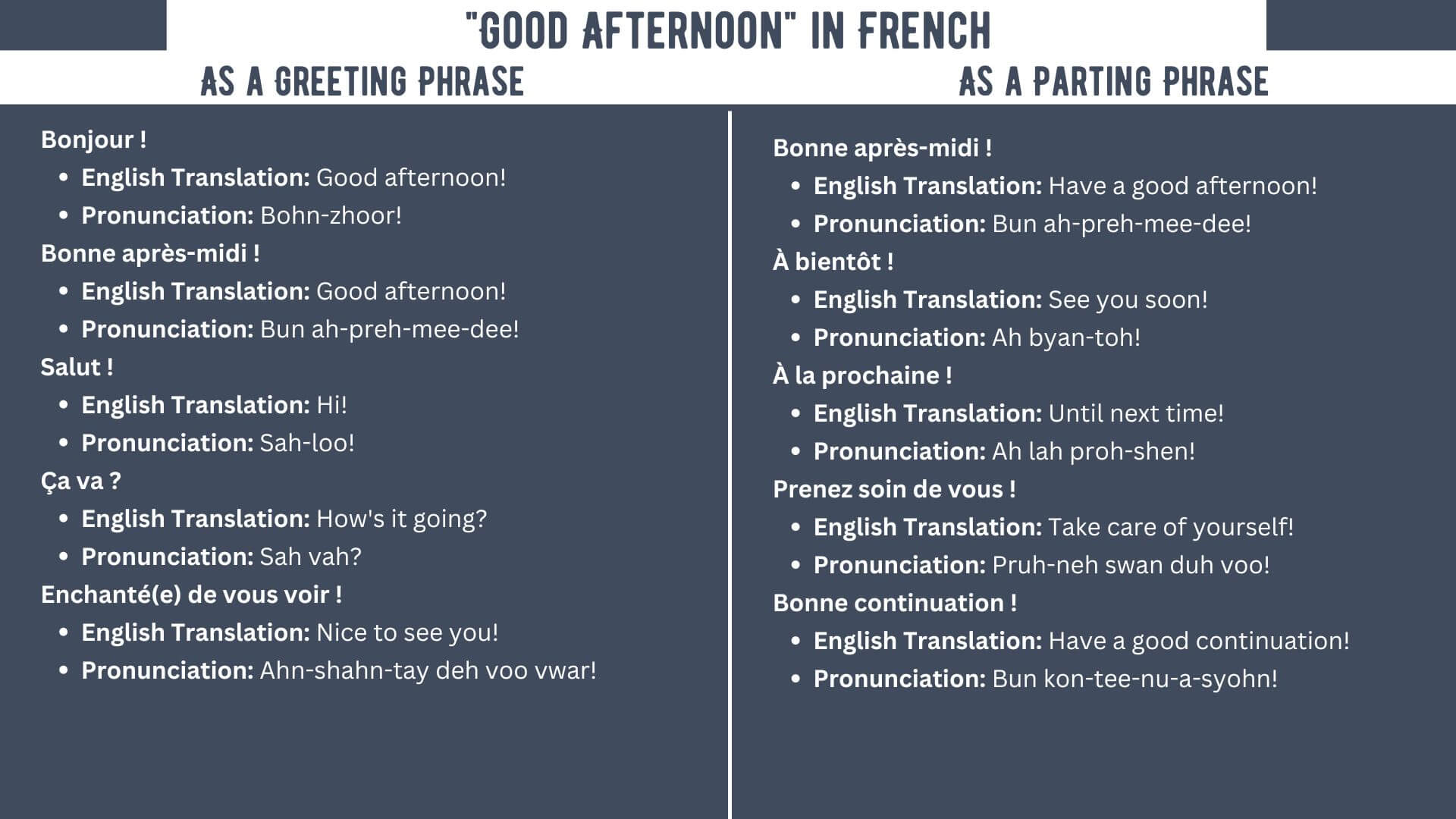In French, saying “Good Afternoon” isn’t just about knowing the words. You might come across “Bon après-midi” and “Bonne après-midi.” They look similar, right? But they’re used differently, depending on the situation and whom you’re talking to. This guide will help you figure out when to use each one, so you can fit right in, whether you’re in a casual setting or a more formal one. Knowing these phrases and when to use them helps you communicate better and shows respect.
Understanding “Good Afternoon” in French
Understanding how to say ‘Good Afternoon’ in French is pretty straightforward, but there are a couple of things to keep in mind. You might hear ‘Bon après-midi’ or ‘Bonne après-midi.’ Both are correct, but which one you use can depend on where you are and who you’re talking to. It’s a small detail, but it shows how knowing the right phrase helps you fit in better. So, when you choose your greeting, think about the setting and who you’re chatting with. It makes a difference!
Bon après-midi vs. Bonne après-midi
Both ‘Bon après-midi’ and ‘Bonne après-midi’ mean ‘good afternoon’ in French, but there are small differences to note. Most people use ‘Bon après-midi,’ and the French Academy prefers it too. It keeps to the traditional male form of ‘après-midi.’ On the other hand, ‘Bonne après-midi’ uses the female form ‘bonne’ and sounds less formal. It’s common in everyday talk. So, your choice depends on how formal you want to be, but either way, people will understand you.
Usage in Different Contexts
Formal vs. Informal Settings
Understanding when to use formal or informal greetings in French is key, especially when considering the social setting. In formal situations, like at work or at a ceremony, it’s best to say Bon après-midi, and add a respectful title such as Monsieur, Madame, or Mademoiselle. This shows you’re polite and understand the expected social manners.
On the other hand, in a relaxed setting with friends, you can simply say Bon aprèm. This is a more casual way to greet, showing you’re comfortable and friendly. Knowing which greeting to use helps in communicating clearly and shows you respect the culture and social norms.

Formal Situations
| French | English Translation | Pronunciation |
| Bonjour ! | Good afternoon! (literally means “Good day!”) | Bohn-zhoor! |
| Bonne après-midi ! | Good afternoon! | Bun ah-preh-mee-dee! |
| Bonsoir ! | Good evening! (used later in the day) | Bohn-swahr! |
| Je vous souhaite un bon après-midi ! | I wish you a good afternoon! | Zhuh voo swet un bohn ah-preh-mee-dee! |
| J’espère que vous passez une bonne journée ! | I hope you are having a good day! | Zh’es-pehr kuh voo pah-say un bun zhoor-nay! |
Informal Situations
| French | English Translation | Pronunciation |
| Salut ! | Hi! | Sah-loo! |
| Coucou ! | Hi there! (very informal) | Koo-koo! |
| Ça va ? | How’s it going? | Sah vah? |
| Comment ça va ? | How’s it going? (more casual) | Koh-mohn sah vah? |
| Hey ! | Hey! (informal greeting) | Ey! |
Also Read: How To Say “What” In French? 6 Unique Terms You Should Know
As a Greeting vs. As a Parting Phrase
In French, ‘Bon après-midi’ is both a greeting and a goodbye, depending on the time and situation. Usually, you say ‘Bonjour’ when you meet someone early in the afternoon. But as the day moves on, ‘Bon après-midi’ works well when you’re leaving. It’s a nice way to wish someone a good rest of the day. The key is knowing when to use it, so it fits the moment whether it’s a casual or formal setting. This helps you communicate better in French.

Greetings
| French | English Translation | Pronunciation |
| Bonjour ! | Good afternoon! | Bohn-zhoor! |
| Bonne après-midi ! | Good afternoon! | Bun ah-preh-mee-dee! |
| Salut ! | Hi! | Sah-loo! |
| Ça va ? | How’s it going? | Sah vah? |
| Enchanté(e) de vous voir ! | Nice to see you! | Ahn-shahn-tay deh voo vwar! |
Parting Phrases
| French | English Translation | Pronunciation |
| Bonne après-midi ! | Have a good afternoon! | Bun ah-preh-mee-dee! |
| À bientôt ! | See you soon! | Ah byan-toh! |
| À la prochaine ! | Until next time! | Ah lah proh-shen! |
| Prenez soin de vous ! | Take care of yourself! | Pruh-neh swan duh voo! |
| Bonne continuation ! | Have a good continuation! | Bun kon-tee-nu-a-syohn! |
Also Read: 5 Ways To Say “Good Evening” In French – An Ultimate Guide
Conclusion
To put it simply, getting the hang of saying ‘Good Afternoon’ in French means knowing when to use ‘Bon après-midi’ versus ‘Bonne après-midi.’ Choosing the right phrase matters a lot, as it can change how formal you sound. Also, it’s good to know that people in different parts of the French-speaking world might use these phrases differently. By understanding these little details, you’ll not only fit in better but also show that you respect their culture. This is key to communicating well in French. Keep visiting the Translation Blog for more translation articles like this.

